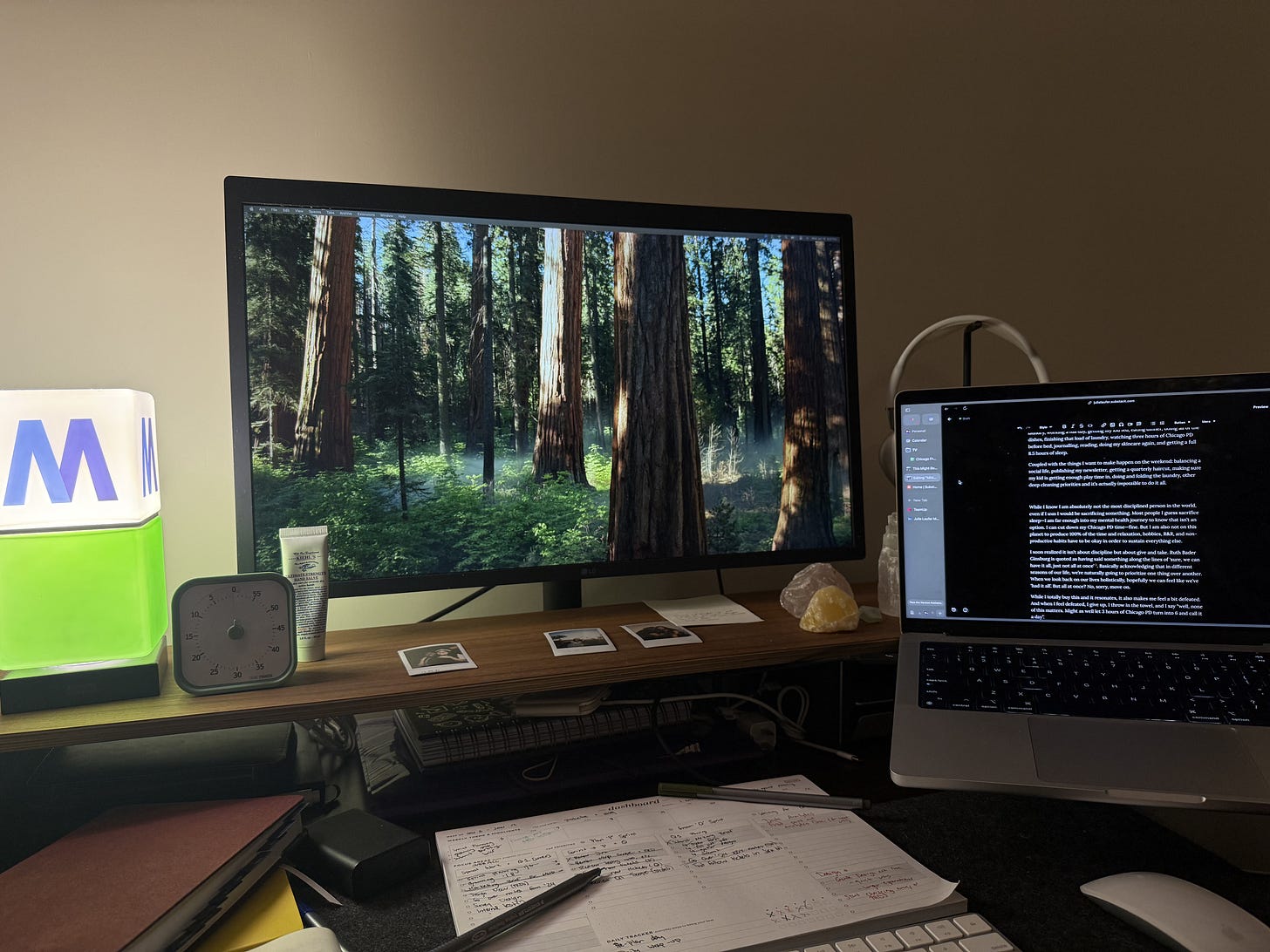Minimum Viable Bullshit
Part One: The Myth of the Perfect Routine
Welcome to Part One of a three-part series on creating routines that are small (minimum) but still get at what we need them to (viable). You can read the rest of the series here.
When I started my newsletter, I promised myself I would never turn my career experience into a metaphor for life lessons (as so many people do and have done on LinkedIn1). I told myself I would maybe sometimes talk about work or my career and that I would definitely often talk about my life but I said I would never ever talk about how something at work taught me a lesson about something in my life—or vice versa.
I am sorry to tell you, dear reader, that I am about to go back on that promise to myself and to you. I think it’s worth it. But first, some context.
We’re currently in the first half of January, so naturally I have been thinking a lot about routines, striving for perfection, getting back on the grind, attempting to have it all, etc. I did an exercise where I wrote out what my perfect week looked like, and highlighted all of the things I’d spend my time doing if I were a robot and had the discipline to manage it all. I looked at how many hours there were in a week. I reserved 8.5 hours a day for sleep, 8 hours a day for work, and started to plot all of the perfect little routines and tasks I wanted to do in the remaining 52.5 weekly hours. I even made sure to account for things like eating and showering!
When I wrote out everything I wanted to do in a week, I very quickly understood that I unfortunately don’t have enough hours2. In my head, my perfect Monday-Friday routine is something like: waking up, writing, getting my kid ready for daycare, working out, doing my skincare, starting a load of laundry, working a full day, getting my kid fed, eating dinner, doing all of the dishes, finishing that load of laundry, watching three hours of Chicago PD/Fire/Med before bed, journalling, reading, doing my skincare again, and getting a full 8.5 hours of sleep.
Coupled with the things I want to make happen on the weekend—balancing a social life, publishing my newsletter, getting a quarterly haircut, making sure my kid is getting enough play time in, doing and folding the laundry, grocery shopping, time with my family, other deep cleaning priorities— it’s actually impossible to do it all.
While I know I am absolutely not the most disciplined person in the world, even if I was I would be sacrificing something. Most people, I guess, sacrifice sleep—I am far enough into my mental health journey to know that isn’t an option. I can cut down my One Chicago time—fine. I’ll give you one episode a night instead of three. I am not on this planet to produce 100% of the time and relaxation, hobbies, R&R, and non-productive habits3 have to be okay in order to sustain everything else.
I soon realized it isn’t about discipline but about give and take. Ruth Bader Ginsburg is quoted as having said something along the lines of ‘sure, we can have it all, just not all at once’4. Basically acknowledging that in different seasons of our life, we’re naturally going to prioritize one thing over another. When we look back on our lives holistically, we can (hopefully) feel like we’ve ‘had it all’. But all at once? No, sorry, move on.
While I totally buy this and it resonates, it also makes me feel a bit defeated. And when I feel defeated, I give up, I throw in the towel, and I say “well, none of this matters. Might as well let 3 hours of Chicago PD turn into 6 and call it a day”.
Is this a healthy response? No. But I don’t like being told what I can and can’t do, and my brain doesn’t totally accept this as truth. As I sit here, looking at all I want to accomplish, I can’t help but wonder (in my best Carrie Bradshaw voice): is there a way to get at having it all without actually having it all?
What is she on about, you think to yourself, threatening to close this browser tab for good.
Stick with me, please.
Is there a way where I can: 1) figure out why I want these things to be part of my routine, 2) figure out what each of these things are trying to achieve and what needs they meet, and then 3) ask myself: what’s the minimum viable routine or outcome to get me there?
Yes, I believe there is. And here’s where the cringey and nauseating connection to Product Management comes back to haunt us.
In Product Management, a Minimum Viable Product (MVP) is the simplest version of a product that delivers real value to users while allowing for future improvements. It’s not about doing the least but rather about trying to figure out how to build the thing that matters the most first.
The viability part is key. We’re not just trying to build the bare minimum, but rather something that also provides value to users. We don’t need to have it all figured out, but an MVP means “okay, this is good enough to go to market with. We’ll figure out the rest later”.
I talk a lot about MVPs in my work life—in fact, I’m in the middle of building one now. Often, we go from a place of big lofty beautiful ideas and realize “okay yeah I love this, but it’s going to take a year to build.” We then refine, figure out the core of the user problems we’re trying to solve and work collaboratively to figure out how we can get to the essence of that solution in the smallest way. We’re not sacrificing the problem-solving or useful aspects of it, but maybe some functionality that we’d consider nice-to-haves5.
There is a lot to be read and talked about in the world of MVPs in Product (and lots of nuance I know I missed) but this isn’t a Product Management newsletter so I’m going to let this explanation rest here. If you’re interested and want to learn more, I bestow upon you the power of a good Google search.
So, as I was looking at my 35-hour daily routine, it hit me—these things are all important to me, but am I being too restrictive or prescriptive about how I get there? Are there lessons to be learned from my work life? Maybe this isn’t about being disciplined or ambitious but rather figuring out what really matters, to me, first and foremost.
Maybe I don’t need a perfect routine—is one that is minimum and viable enough? What could that look like?
The realization that routines don’t have to be perfect to be valuable (or yes, viable) has not only changed the way I approach almost everything, but has also relieved a bulk of the pressure I put on myself. It’s a reminder that sometimes doing just enough can be more than just enough.
In the next part, I’ll talk about how I redefined my routines—like skincare, writing, and even cleaning—by applying the simplest of Product Management principles to my day-to-day. It’s not perfect, and I’m not perfect, but so far it’s really helped me feel comfortable with doing just enough.
What about you? Are there parts of your routine you’re overcomplicating and could benefit from a new lens? Share your thoughts below—I’d love to hear them!
And when you’re ready, read Part Two below.👇👇
Minimum Viable Everything
In my last piece, ‘Minimum Viable Bullshit’, I talked about the myth of the perfect routine—how I’ve often fallen into the trap of trying to cram 35 hours of goals into a 24-hour day and then wonder why I’m exhausted, overwhelmed, and still falling short. I came to terms with the fact that I can’t “have it all” (at least not all at once) and also found a way to make it feel like I do (kind of). Yes, I want to have my cake and eat it. Don’t we all?
Thanks for reading This Might Be Cringe! If you enjoyed this one, please consider subscribing or treating me to my next skim cortado.
For example, this gem: “What proposing to my girlfriend taught me about B2B Sales”
Time may be a social construct, but 24 hours is 24 hours.
like watching three Dick Wolf shows simultaneously and in the order that they were released that all take place in the same city but highlight three distinct industries with mostly separate characters and plots but sometimes overlapping…
Here’s the actual quote, which I butchered initially: "You can’t have it all, all at once. Who—man or woman—has it all, all at once? Over my lifespan I think I have had it all. But in different periods of time things were rough. And if you have a caring life partner, you help the other person when that person needs it."
For example, when Threads first launched, hashtags didn’t make it into their MVP, which I kind of love. It’s become such a basic social paradigm but I guess they figured “we’ll add it, people will know how to use it, but we can provide value NOW if we get this out without it”.





I love this! I am OBSESSED with time use/time scarcity. I wrote my first published scientific paper on it many years ago, but have been thinking about it since I was 12 and read cheaper by the dozen. I now forget what was in that book, but something in jt convinced me that brushing my teeth in the shower would give me a lifetime of minutes back. In any case, as a scientist, frequent traveler, parent, and aspiring writer, I am also constantly thinking about where I can shave off time- but I’ve never thought of it in the terms you’ve laid out. Looking forward to seeing what the MVP of your routine is!
unbelievably shook that I have to wait for part 2 of this. the audacity. part of my "I can have it all" curse is that I'm just ONE LIFE HACK AWAY from having it all.